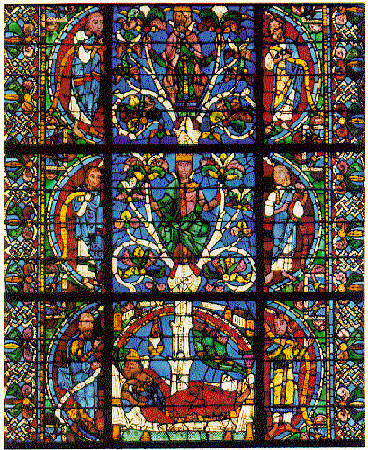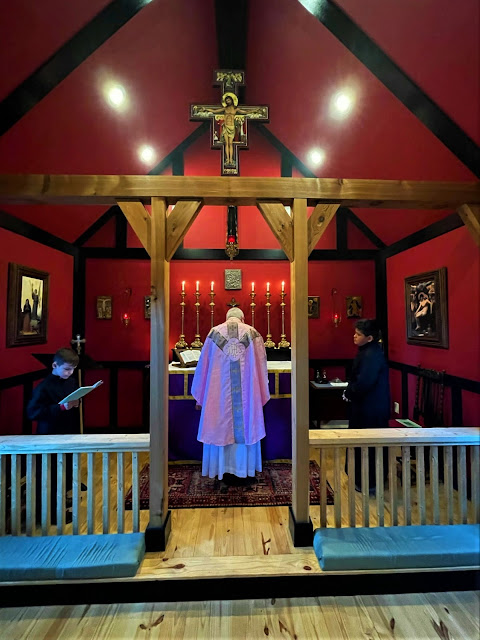Thus says the Lord: But you, O Bethlehem Ephrathah, who are little to be among the clans of Judah, from you shall come forth for me one who is to be ruler in Israel, whose origin is from of old, from ancient days.
- Micah 5:2
We’re accustomed to thinking of Advent as a time of preparation – preparation for the celebration of the Nativity of our Lord Jesus Christ, and preparation for his return on the Last Day, when he will come to be our Judge. But Advent also is a time of fulfillment – a time when all the things that God promised throughout the ages, have actually come to pass. John the Baptist, as the Voice crying in the wilderness had been foretold, and then he came. Mary, the Mother of our Lord, had been foretold as the Virgin who would conceive and bear a Son, and so she did. Detail after detail was foretold in the Scriptures, and we see each one of them fulfilled, reminding us that when God promises, He always makes good on His promises.
The words of Micah tell of a promise made eight centuries before Christ’s birth. It was promised in a place called Judah, at a time which was very dark in the history of the Jews. Assyria had risen up as an overwhelming military and political power, and they had already successfully invaded the Northern Kingdom of Israel. They had destroyed families and had leveled towns, and had taken those who survived off into exile. The people of Judah were now living under this dark and menacing cloud; their homes and possessions were being destroyed; more and more of them were being killed. They thought they were on the brink of destruction.
But just when things were most bleak, God sent a prophet named Micah. He reminded the people of some very difficult things. He reminded them of how, as a nation, they had put their morals aside. He reminded them of how they had become luke-warm in their love for God, and had even begun to worship idols. He made them look at the consequences of these things they were doing – reminding them that their society had become so weak that it was easy for an enemy to overwhelm them. He asked them, “Why are you surprised?”
And yet, Micah didn’t stop with that message. He went on to remind them that God still loved them, and that there was real hope for the future. From Bethlehem would come forth a king, who would be ruler over all of Israel, and in him would be peace. Yes, the people would have to go into exile for a while; and yes, the days would still seem to be dark. But that glimmer of hope was held before their eyes; that tiny flame which would begin burning in the little town of Bethlehem would bring healing to the nation and salvation to the people. It was a promise made by God, and God always keeps His promises.
We need to keep that fact in mind: God always keeps His promises. As we see our own nation setting morality aside; as we witness arrogance in our leaders and selfishness in so many of our people and an increasing sense of the cheapness of human life, we need to remember that God does keep His promises. Although it is possible for a nation, as a nation, to lose God’s blessing, He still loves each person within that nation. And that promise of God’s love for us helps us get the attention away from our problems, so that, rather than concentrating on our disappointments, it can actually refine our faith, and give us hope as we remember what God has done.
No matter what difficulty we face – whether it be the troubles we face as a nation, or the difficulties we might have in our personal lives, God doesn’t forget us. He remembers us, He hears our prayers, and He responds in his perfect timing, just as He answered the long years of prayer by Zechariah and Elizabeth for a child when they were in their old age; and as He blessed the young Virgin Mary for her unwavering trust and obedience, when He showed his great love for us in the fact of the Incarnation, that statement of God’s amazing love, a love so great that He sent His only Son to earth, to be one of us, to fulfill the promise given through the archangel Gabriel, that He would save us from our sins.
No, God doesn’t forget us. He is working out His perfect plan on His own timetable. And this is a message we need to hear and take to heart. Even in the times of darkness or despair; in our times of struggle to have hope — we need to trust that God is working out a new and better future for us, and that His love will never give up on us. Because we are God’s people, we are a people of hope and love. In being touched by God’s love we can love others; in remembering God’s mercy to His children in the past, we can trust that there is hope for us too. Just as Micah promised a coming king of Israel who would “be great to the ends of the earth;” so we, like the people of Judah, need to embrace this King, who is Christ our Lord.
That is what Advent involves: patiently waiting for God, knowing that He always keeps His promises. This is the Advent message of hope and expectation: that God’s love is given to every single one of us. It doesn’t matter how old or young we are. It doesn’t matter what our situation is, God has come to give us hope, and He asks us to live in faith. He asks us to believe in His promises, even though we might not have all the details. Zechariah and Elizabeth didn’t have all the details, and yet they believed. Joseph and Mary certainly didn’t have all the details, and yet they faithfully obeyed God. This wasn’t just blind faith. They believed God because of the evidence of history. God had always kept His promises to His people, and there was no reason for them to think He would stop. And this is the faith God asks of us – not a blind faith, but a faith based on the evidence of what God has already done.
As Elizabeth said to Mary, “Blessed is she who believed that there would be a fulfillment of what was spoken to her from the Lord.” There is always a blessing for us when we listen to the promises of God, and actually believe them. During the few days left in Advent, spend them preparing for the great Solemnity which is coming, the Nativity of our Lord Jesus Christ. And remember that He is the Promised One – the One who keeps His promises – the One foretold by the prophets, the One born of the Virgin Mary, and the One who comes to us today.
_______________________________
Illustration by Margaret Tarrant (1888-1959)















